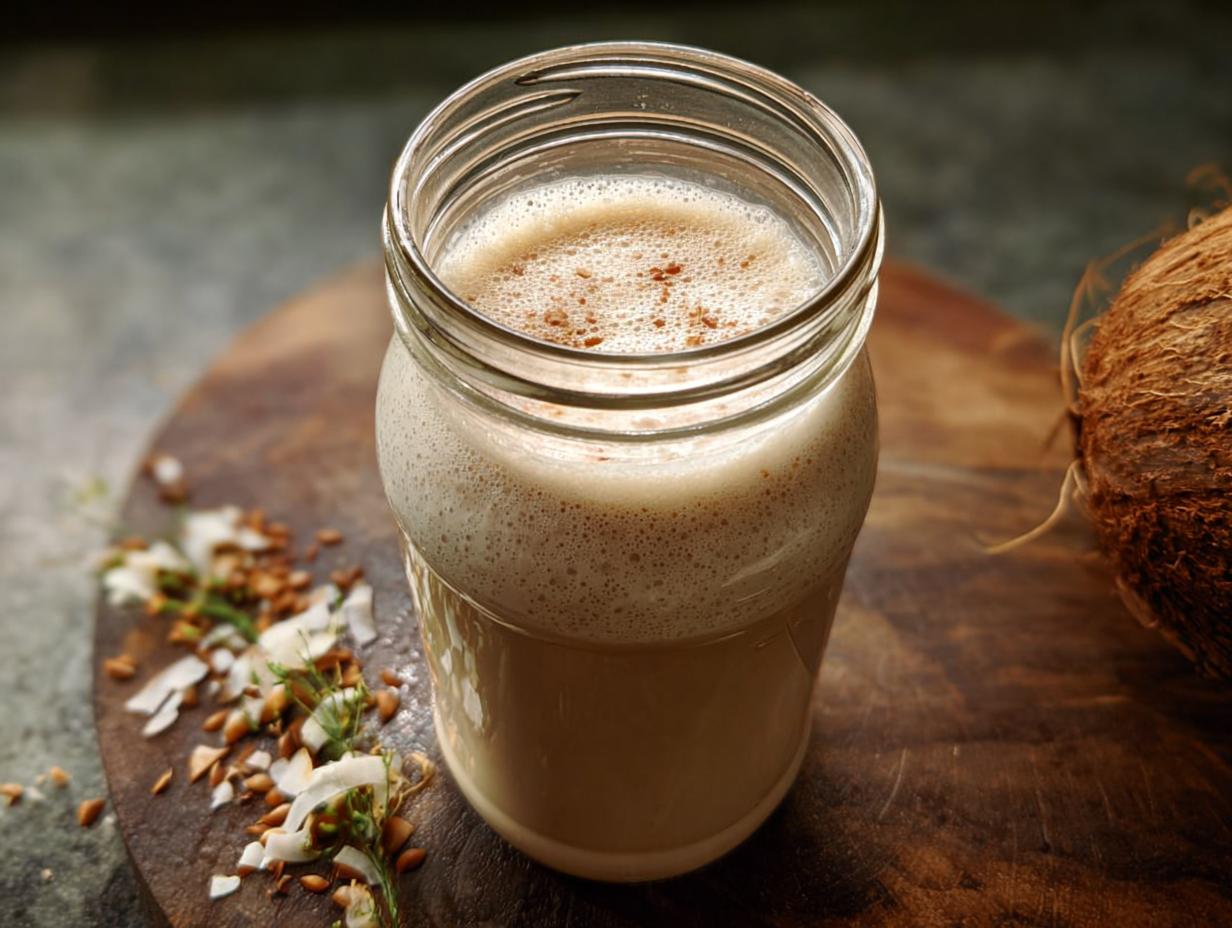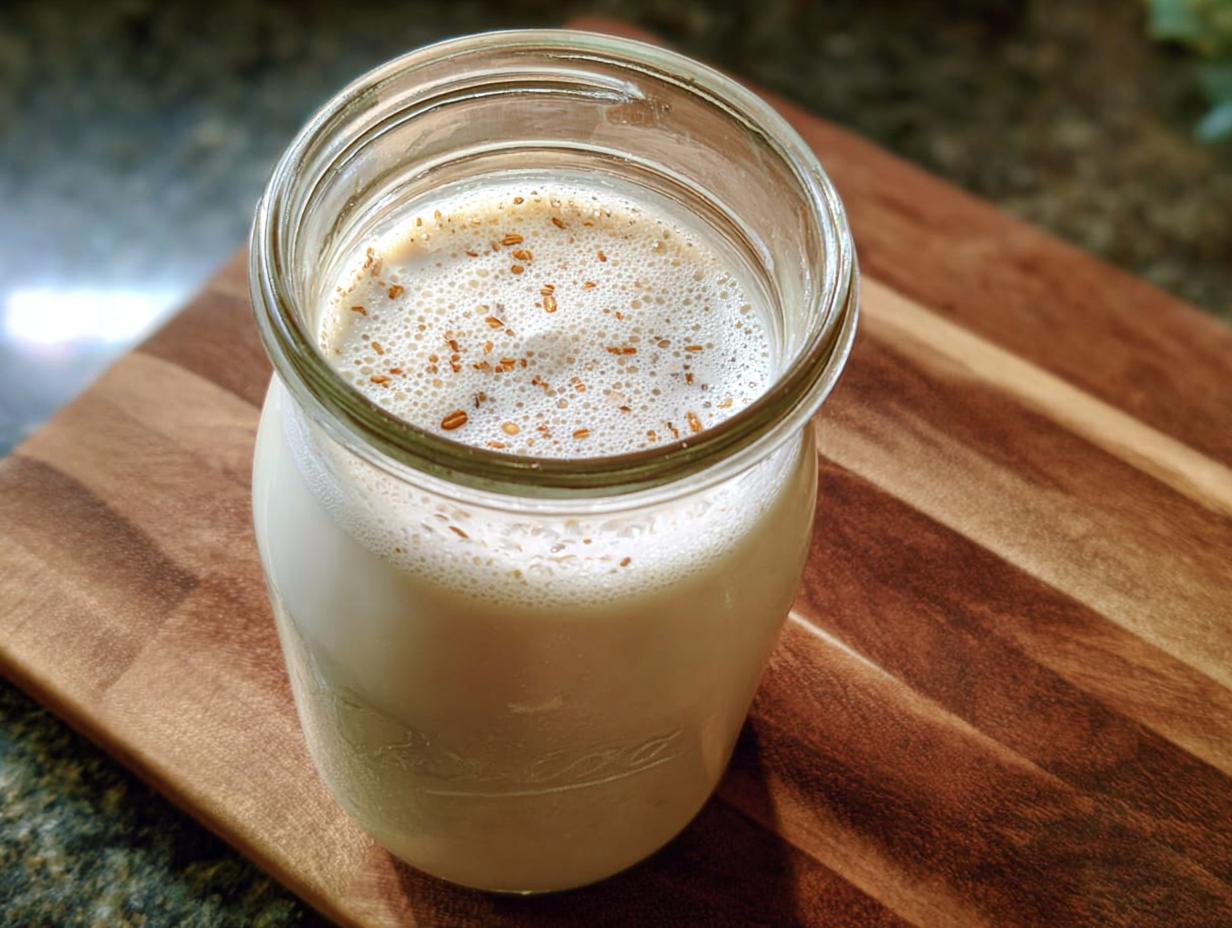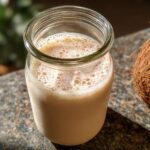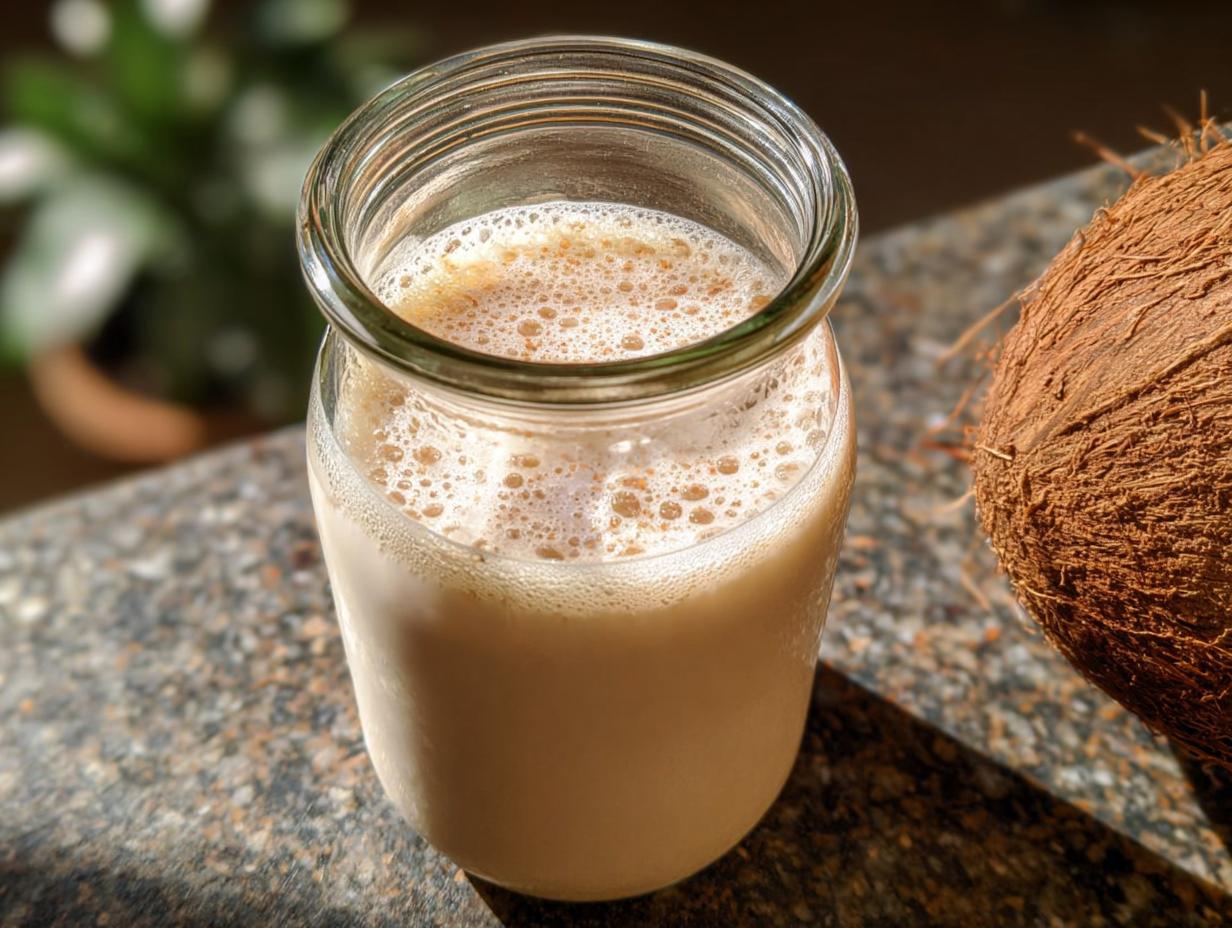Fermented Vegan Kefir Coconut has become my go-to morning ritual for a gut-friendly boost. I remember struggling with digestive issues for years, always feeling bloated and sluggish. Then, I discovered the magic of fermented foods, and this creamy, tangy coconut kefir drink changed everything. The subtle tartness, the hint of sweetness, and that wonderful effervescence make it such a delightful way to start the day. I love that it’s packed with probiotics and is completely dairy-free. Learning how to make vegan kefir coconut at home was surprisingly simple, and I’m excited to share how you can experience the amazing fermented coconut milk benefits too. Let’s get cooking!
What is Fermented Vegan Kefir Coconut?
This vibrant drink is essentially a probiotic powerhouse made from coconut milk, transformed through fermentation. It’s a fantastic way to enjoy the gut-health benefits of kefir without any dairy. We’re talking about a delicious vegan fermented coconut milk that’s teeming with beneficial bacteria. Unlike traditional kefir, this version uses water kefir grains to culture coconut milk, creating a delightful tangy flavor and a gentle fizz. It’s a wonderful coconut kefir no dairy option for anyone looking to support their digestive health or simply enjoy a refreshing, gut-friendly beverage. The fermentation process unlocks nutrients and makes them more bioavailable, contributing to overall well-being. You can learn more about the benefits of fermented foods on Healthline.
Why You’ll Love This Fermented Vegan Kefir Coconut
You’re going to adore this homemade vegan kefir Fermented Vegan Kefir Coconut for so many reasons:
- Incredible Taste: It offers a delightful balance of creamy coconut, a touch of tang, and a subtle fizz that’s super refreshing.
- Quick Prep Time: With only about 15 minutes of hands-on work, it’s an easy addition to your routine.
- Gut Health Champion: Packed with probiotics, this drink is fantastic for supporting a healthy digestive system.
- Budget-Friendly: Making your own is significantly cheaper than buying pre-made probiotic drinks.
- Family-Friendly: Even picky eaters often enjoy the mild, pleasant flavor of this probiotic coconut kefir.
- Dairy-Free Delight: Perfect for vegans or those with lactose intolerance, it’s a true coconut kefir no dairy treat.
- Easy to Source: You can easily find coconut kefir grains vegan online or from other kefir makers to get started.
- Energizing Ritual: It makes for a wonderfully invigorating daily drink that leaves you feeling great.
Ingredients for Homemade Vegan Coconut Kefir
Gathering your ingredients is the first step to delicious homemade vegan coconut kefir. For the creamiest texture, I always opt for full-fat canned coconut milk. You’ll also need your activated coconut kefir starter vegan – these are the magical grains that do all the work! The ground flaxseed is key here; it helps thicken the mixture and adds a lovely texture, contributing to the overall coconut milk kefir fermentation process. Don’t forget filtered water Fermented Vegan Kefir Coconut, a touch of sweetness from maple syrup or coconut sugar, and a hint of vanilla and sea salt to round out the flavors. Optional additions like cinnamon or ginger can add an extra zing!
- 2 cups full-fat canned coconut milk – for a rich, creamy base
- 3 tablespoons water kefir grains – your active starter culture
- 2 tablespoons ground flaxseed – helps thicken and adds texture
- 1 cup filtered water – to achieve the right consistency
- 1 tablespoon maple syrup or coconut sugar – for a touch of sweetness
- 1 teaspoon vanilla extract (optional) – enhances the flavor
- Pinch of sea salt – balances the sweetness
- Optional add-ins: ¼ teaspoon cinnamon or cardamom, 1 tablespoon chia seeds, ½ teaspoon lemon zest or grated ginger – for flavor variations
How to Make Vegan Fermented Coconut Milk
Ready to dive into making fermented coconut kefir? It’s a straightforward process that yields a wonderfully tangy and bubbly drink. If your water kefir grains are dehydrated Fermented Vegan Kefir Coconut, the first step is to activate them. This involves soaking them in a simple sugar-water solution – about ¼ cup sugar in 4 cups of water – for 3 to 4 days at room temperature. Remember to change the water daily to keep them happy and active.
- Step 1: Once your grains are active, grab a clean quart-sized glass jar. Combine the 2 cups full-fat canned coconut milk, 1 cup filtered water, 2 tablespoons ground flaxseed, 1 tablespoon maple syrup or coconut sugar, and the optional 1 teaspoon vanilla extract, along with a pinch of sea salt. Stir everything together really well using a plastic or wooden spoon – metal can be tough on the grains!
- Step 2: Gently stir in your 3 tablespoons water kefir grains. Make sure they’re well distributed in the mixture.
- Step 3: Cover the mouth of the jar with cheesecloth and secure it with a rubber band. This allows the mixture to breathe while keeping any unwanted critters out.
- Step 4: Place the jar in a warm, dark spot. Aim for a temperature between 68°F and 78°F (20°C–25°C). This is where the magic happens! Let it ferment for 24 to 48 hours. You’ll know it’s starting to work when you see small bubbles forming and catch a pleasant, tangy aroma.
- Step 5: After about 24 hours, give it a taste. If it’s still quite sweet, let it continue fermenting for another 12 to 24 hours. The perfect dairy-free kefir recipe is ready when it’s mildly tangy, has a slight effervescence, and isn’t overly sweet anymore.
- Step 6: Once it tastes just right, strain the fermented mixture using a fine-mesh plastic strainer. This step is crucial for separating your precious kefir grains.
- Step 7: Store your strained kefir grains in a bit of fresh sugar water in the fridge – they’ll be ready for your next batch!
- Step 8: Pour the finished fermented coconut milk into a clean jar or bottle and pop it in the refrigerator. Give it a good shake before serving your delicious vegan fermented coconut milk.

Pro Tips for the Best Fermented Vegan Kefir Coconut
Achieving that perfect tang and creamy texture in your homemade vegan kefir Fermented Vegan Kefir Coconut is all about a few key details. Following these tips will help ensure your fermentation is successful and delicious every time!
- Always use full-fat, unsweetened canned coconut milk. Low-fat or sweetened varieties can affect fermentation and taste.
- Maintain a consistent temperature. A slightly warmer spot, around 70-75°F, encourages faster fermentation and better probiotic activity.
- Don’t over-ferment! Taste-testing regularly is essential. Over-fermenting can lead to an overly sour flavor and a less desirable texture.
- Be patient with your grains. If they seem sluggish, try a different sweetener or ensure they are properly activated.
What’s the secret to perfect coconut kefir fermentation?
The real secret lies in consistency and gentle handling. Ensuring your coconut kefir grains vegan are healthy and in a stable, warm environment (around 70-75°F) is crucial for optimal fermentation. Proper grain care prevents off-flavors and ensures a delightful tang.
Can I make homemade vegan coconut kefir ahead of time?
Yes! You can prepare the base mixture (coconut milk, water, sweetener, flaxseed) and store it in the refrigerator for up to 24 hours before adding the kefir Fermented Vegan Kefir Coconut grains and starting fermentation. This is a great way to prep for a busy morning. For more make-ahead tips, check out these breakfast recipes.
How do I avoid common mistakes with coconut kefir grains?
Avoid using metal utensils or containers, as they can harm the grains. Also, ensure you’re using unsweetened Fermented Vegan Kefir Coconut, full-fat coconut milk. Using sweetened or low-fat versions can hinder the grains’ ability to ferment properly and affect the final taste.
Best Ways to Serve Coconut Kefir
Enjoying your homemade fermented coconut kefir is the best part! It’s wonderfully versatile. For a quick and energizing start to your day, blend it into a smoothie. It adds a lovely creamy texture and a probiotic boost to your favorite fruits and vegetables. Try pairing your vegan probiotic drink coconut with berries, spinach, and a touch of ginger for a refreshing, nutrient-packed beverage. You can also enjoy it chilled on its own, perhaps with a splash of extra water if you prefer a thinner consistency. For a treat, consider a second fermentation by adding a few fresh berries or a slice of mango to the strained kefir and letting it sit at room temperature for another 12-24 hours to develop more fizz and fruity flavor.

Nutrition Facts for Fermented Coconut Kefir
This delicious dairy-free kefir Fermented Vegan Kefir Coconut is a fantastic way to add probiotics to your diet. Per serving (about ½ cup), you can expect:
- Calories: N/A (Estimates vary based on coconut milk and sweeteners used)
- Fat: N/A
- Saturated Fat: N/A
- Protein: N/A
- Carbohydrates: N/A
- Fiber: N/A
- Sugar: N/A
- Sodium: N/A
Nutritional values are estimates and may vary based on specific ingredients and fermentation time. This makes it a wonderful Fermented Vegan Kefir Coconut , customizable option for a healthy beverage. For other healthy options, explore these carnivore diet recipes.
How to Store and Reheat Fermented Vegan Kefir Coconut
Proper storage is key to preserving the goodness of your homemade fermented vegan kefir coconut. Once your batch is strained, pour the finished liquid into clean glass jars or bottles. Make sure they have airtight lids to keep it fresh in the refrigerator. It generally stays good for about 1 to 2 weeks when kept consistently cold. While this vegan fermented coconut milk is best enjoyed chilled, you can also freeze it! Pour it into freezer-safe containers, leaving some headspace for expansion. Frozen kefir can last for several months, though some texture changes might occur upon thawing. To reheat, simply thaw it overnight in the refrigerator. It’s important to note that while freezing is an option, the probiotic activity might be reduced. For the best fermented coconut milk benefits, consuming it within the first week of refrigeration is ideal.
Frequently Asked Questions About Coconut Kefir
Is coconut kefir vegan?
Absolutely! This recipe is specifically designed to be vegan. We use water kefir grains and coconut milk, completely avoiding any animal products. It’s a fantastic vegan probiotic drink coconut option for anyone following a plant-based diet or looking for dairy-free alternatives.
What are the benefits of fermented coconut milk?
The primary benefits come from the probiotics produced during fermentation. These beneficial bacteria can help support a healthy gut microbiome, which is linked to improved digestion Fermented Vegan Kefir Coconut, better nutrient absorption, and even enhanced immune function. It’s a delicious way to boost your gut health with this fermented coconut milk benefits powerhouse!
What is the best vegan kefir coconut recipe?
While “best” is subjective, this recipe is a great starting point for a delicious and easy-to-make fermented vegan kefir coconut. It focuses on full-fat coconut milk for creaminess and uses active water kefir grains for a balanced tang. Many find this combination to be the best vegan kefir coconut for its flavor and ease of preparation. For more recipe inspiration, check out the latest recipes.
Can I use coconut water instead of coconut milk?
Yes, you can! If you prefer a lighter Fermented Vegan Kefir Coconut, less creamy beverage, using coconut water is a great option. This would be considered a coconut water kefir vegan. The fermentation process will be similar, but the final texture and flavor will be less rich and more watery, similar to traditional water kefir.
Variations of Vegan Kefir Coconut You Can Try
Once you’ve mastered the basic fermented vegan kefir coconut, don’t be afraid to experiment! The beauty of making your own is customization. For a lighter, more refreshing drink Fermented Vegan Kefir Coconut, try swapping out some or all of the coconut milk for coconut water. This creates a delightful coconut water kefir vegan that’s less creamy but equally probiotic-rich. If you’re aiming for something thicker, almost like a yogurt, you can extend your fermentation time or add a bit more ground flaxseed or even chia seeds. This can lead to a consistency closer to a fermented coconut yogurt vegan. Another fun approach is a second fermentation. After straining your initial batch, add fresh or frozen fruits, a touch of honey, or spices like cinnamon and let it ferment for another 12-24 hours in a sealed bottle. For more ideas on flavor pairings, consider these spicy pineapple jalapeno chutney recipes.
Print
Fermented Vegan Kefir Coconut: Deliciously Easy Recipe
- Total Time: 2 days 15 minutes
- Yield: 4 servings 1x
- Diet: Vegan
Description
A gut-friendly, dairy-free beverage made with coconut milk, flaxseed, and water kefir grains. This fermented drink is rich in probiotics and easy to make at home for a daily energizing ritual.
Ingredients
- 2 cups full-fat canned coconut milk
- 3 tablespoons water kefir grains
- 2 tablespoons ground flaxseed
- 1 cup filtered water
- 1 tablespoon maple syrup or coconut sugar
- 1 teaspoon vanilla extract (optional)
- Pinch of sea salt
- Optional add-ins: ¼ teaspoon cinnamon or cardamom, 1 tablespoon chia seeds, ½ teaspoon lemon zest or grated ginger
Instructions
- If your water kefir grains are dehydrated, activate them by soaking in sugar water (¼ cup sugar in 4 cups water) for 3–4 days at room temperature, changing the water daily.
- In a clean quart-sized glass jar, combine coconut milk, filtered water, ground flaxseed, maple syrup (or coconut sugar), vanilla extract, and sea salt. Stir well with a plastic or wooden spoon.
- Gently stir in your activated water kefir grains. Avoid metal utensils.
- Cover the jar with cheesecloth secured by a rubber band.
- Let it ferment in a warm, dark place (68°F–78°F) for 24 to 48 hours. Look for small bubbles and a tangy aroma.
- After 24 hours, taste the fermented coconut kefir. If it’s still sweet, continue fermenting for another 12–24 hours. It is ready when mildly tangy, slightly effervescent, and not very sweet.
- Strain the fermented vegan kefir using a fine mesh plastic strainer. Save the kefir grains in sugar water in the fridge for your next batch.
- Pour the fermented coconut milk into a clean jar or bottle and refrigerate.
- Shake well before serving your vegan fermented coconut milk.
Notes
- Use full-fat canned coconut milk for the best creamy texture.
- Avoid sweetened coconut milk.
- Metal can harm kefir grains; use non-reactive utensils and containers.
- A warm environment speeds up fermentation.
- For more fizz or flavor, you can perform a second fermentation with fruits or spices.
- This recipe yields a delicious dairy-free kefir.
- Prep Time: 15 minutes
- Cook Time: 0 minutes
- Category: Beverage
- Method: Fermentation
- Cuisine: Western
Nutrition
- Serving Size: ½ cup
- Calories: N/A
- Sugar: N/A
- Sodium: N/A
- Fat: N/A
- Saturated Fat: N/A
- Unsaturated Fat: N/A
- Trans Fat: N/A
- Carbohydrates: N/A
- Fiber: N/A
- Protein: N/A
- Cholesterol: N/A
Keywords: Fermented Vegan Kefir Coconut, vegan fermented coconut milk, dairy-free kefir, how to make vegan kefir coconut, coconut kefir, fermented coconut milk benefits, dairy-free kefir recipe, coconut kefir grains vegan, homemade vegan coconut kefir, probiotic coconut kefir, coconut milk kefir fermentation, is coconut kefir vegan, vegan probiotic drink coconut, fermented coconut yogurt vegan, coconut water kefir vegan, coconut kefir starter vegan, making fermented coconut kefir, best vegan kefir coconut
